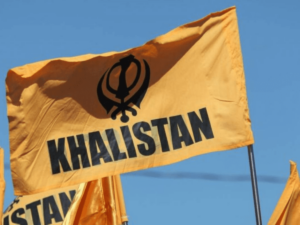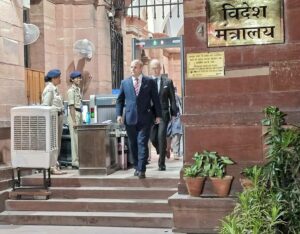Many who relied on strong Indo-Canadian relations now find their livelihoods threatened by Trudeau’s diplomatic brinkmanship, writes Dr Hardev Singh
The unfolding drama of Justin Trudeau’s desperate political maneuvering has exposed a disturbing reality – the cynical exploitation of Canada’s Sikh minority for electoral gains. His recent humiliating admission before the Commission of Inquiry, acknowledging the absence of concrete evidence while making serious allegations against India, reveals the true nature of his government’s relationship with the Sikh community: one built on manipulation, false promises, and political convenience. Since assuming office in 2015, Trudeau has orchestrated an elaborate charade of support for Sikh interests while systematically undermining the community’s long-term welfare. His government’s infamous decision to scrub mentions of Sikh extremism from national security reports in 2018 wasn’t an act of protection but a calculated political move that has backfired spectacularly. By blurring the lines between legitimate community concerns and extremist agendas, Trudeau has effectively painted all Sikhs with the same broad brush of separatism, doing irreparable damage to the community’s reputation.
The painful irony of this situation lies in how Trudeau’s political theater has trapped law-abiding Sikh Canadians in an impossible position. These hardworking citizens, who have contributed immensely to Canada’s prosperity and cultural fabric, now find themselves unwittingly associated with radical elements they neither support nor endorse. Trudeau’s government has effectively silenced moderate voices while amplifying extremist ones, creating a distorted narrative that serves his political interests at the expense of community harmony. This manipulation became glaringly apparent in the government’s handling of the Nijjar case. By making unsubstantiated allegations against India on the floor of Parliament, Trudeau wasn’t protecting Sikh interests – he was using the community as a shield for his failing political agenda. The resulting diplomatic crisis has left Sikh Canadians bearing the brunt of deteriorating Indo-Canadian relations, with many finding their business interests, family ties, and cultural connections severely compromised.

The recent vandalisation of the BAPS Swaminarayan Mandir in Edmonton stands as a testament to how Trudeau’s permissive approach toward extremist elements has fostered an environment of increasing hostility. Under the guise of protecting freedom of expression, his government has allowed radical elements to flourish while moderate Sikhs watch helplessly as their community’s reputation is tarnished. Trudeau’s government has mastered the art of using the Sikh community as a convenient political tool. When faced with criticism about harboring individuals wanted for terrorism, his administration hides behind hollow rhetoric about minority rights and freedom of expression. This cynical strategy ignores India’s legitimate security concerns while continuing to exploit Sikh identity for domestic political gain.
The economic fallout of this failed approach has been particularly severe for Sikh businesses and professionals. Many who relied on strong Indo-Canadian relations now find their livelihoods threatened by Trudeau’s diplomatic brinkmanship. The community’s economic interests have been sacrificed on the altar of his political ambitions, with no tangible benefits to show for their loyalty. Perhaps most damaging is how Trudeau’s policies have created artificial divisions within the Sikh community itself. By elevating certain radical voices while marginalizing moderate perspectives, his government has disrupted the community’s internal cohesion. This manufactured division serves only to strengthen Trudeau’s political grip while weakening the community’s ability to advocate for its genuine interests.
The depth of this exploitation becomes even more apparent when examining how Trudeau’s government has handled India’s extradition requests. While publicly championing Sikh rights, his administration has effectively trapped the community in a diplomatic crossfire. The resulting isolation from India has created unnecessary hardships for countless Sikh families who maintain strong cultural and familial ties with their homeland. Recent polls showing Trudeau’s plummeting popularity reveal the hollowness of his support for the Sikh community. As his political fortunes decline, it becomes increasingly clear that his government’s approach was never about protecting minority rights or advancing Sikh interests. Instead, it has always been about maintaining political power at any cost, even if that means exploiting and ultimately harming the very community he claims to champion.

The cost of this political manipulation extends far beyond immediate diplomatic tensions. Trudeau’s reckless approach has created a legacy of suspicion and mistrust that may take generations to overcome. His government’s actions have not only damaged the reputation of Sikh Canadians but have also complicated their future relationship with both their adopted country and their homeland. For the Sikh community to move forward, there must be a clear recognition of how they’ve been manipulated for political gain. Trudeau’s politics of division and exploitation must be rejected in favor of leadership that genuinely respects and advances minority interests without compromising national security or international relations. The community needs leaders who can distinguish between legitimate advocacy and extremist agendas, and who won’t sacrifice long-term community welfare for short-term political gains.
Canada would do well to heed the cautionary tale of Pakistan, where the weaponisation of minority and religious extremism transformed a promising nation into a sanctuary for terror. The disturbing parallels are hard to ignore – Pakistan’s descent began with political appeasement of radical elements, followed by turning a blind eye to extremist activities in the name of religious freedom, and ultimately culminated in becoming a global hub for terrorism. Today’s Canada, under Trudeau’s leadership, treads a dangerously similar path by allowing separatist elements to flourish, dismissing legitimate security concerns, and compromising diplomatic relations for domestic political gain. The consequences of Pakistan’s choices – international isolation, economic instability, and the erosion of democratic values – should serve as a stark warning to Canadian policymakers. If Canada continues down this perilous road of appeasing extremist elements and sacrificing security for vote bank politics, it risks not only its international reputation but also its fundamental character as a stable, prosperous democracy. This story serves as a warning about the dangers of identity politics and the exploitation of minority communities for electoral advantage. Trudeau’s legacy will not be one of minority empowerment but rather a cautionary tale of how political opportunism can transform a thriving minority community into collateral damage in a leader’s desperate bid to cling to power.









